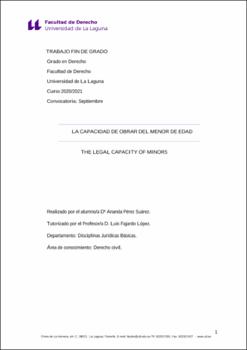La capacidad de obrar del menor de edad.
Author
Pérez Suárez, AnandaDate
2021Abstract
The regime of the capacity to act of minors has experienced a great change, as they were previously
considered absolutely incapable and today a progressive capacity is recognised, depending on their
evolving understanding and will. There has also been a change in its determination since previously the
traditional objective criteria (age) was the main one, and now there is a tendency towards the use of a
subjective criteria (natural capacity) to determine such capacity.
Therefore, this study aims to reflect the current system of the legal capacity of minors as well as its
evolution. Therefore, first of all I will study the concept and its fundamentals in order to subsequently show
the different stages that our law has gone throught with the intention of reflecting the evolution that our
legal system has undergone as a result of constitutional and international principles, and above all, the
introduction of the principle of the child´s best interest, which has meant a formidable advance in this
matter, making the age criteria more flexible to allow more and more acts to be carried out independently
of age, as we will see in the paper. Finally, this work leads with the different treatment of the legal capacity
in the field of health and in Aragonese law; also a brief note is introduced, updating the work after the
reformo of the Civil Code by LO 8/2021 of 2 June, reforming civil and procedural legislation to support
persons with disabilities in the exercise of their legal capacity, and LO 8/2021 of 4 June on the
comprehensive protection of children and adolescents from violence. El régimen de la capacidad de obrar de los menores de edad ha presentado un gran cambio, ya que antes
eran considerados absolutamente incapaces, y a día de hoy se reconoce una capacidad progresiva, en
función de su capacidad evolutiva de entender y querer. También ha presentado un cambio su
determinación, ya que antes se atendía primordialmente al criterio tradicional objetivo (edad), y ahora hay
una tendencia hacia la utilización del criterio subjetivo (capacidad natural) para determinar dicha
capacidad.
Por tanto, este estudio pretende reflejar el sistema actual de la capacidad de obrar de los menores, así
como su evolución. Por ello, en primer lugar, se estudiará el concepto y el fundamento de la capacidad de
obrar para posteriormente mostrar las diversas etapas que ha tenido nuestro Derecho, con la intención de
reflejar esa evolución que ha presentado nuestro ordenamiento a raíz de los principios constitucionales e
internacionales, y sobre todo, la introducción del principio del interés superior del menor, que ha supuesto
un avance formidable en esta materia, permitiendo la flexibilización de la edad para realizar cada vez más
actos, como podremos ver en el estudio. Y finalmente, hablaré del tratamiento diferente de la capacidad de
obrar en materia de sanidad y en el derecho aragonés. Y, por último, indicar, que he procurado actualizar
el trabajo tras la reforma del Código Civil por la LO 8/2021, de 2 de junio, por la que se reforma la
legislación civil y procesal para el apoyo a las personas con discapacidad en el ejercicio de su capacidad
jurídica, y la LO 8/2021, de 4 de junio, de protección integral a la infancia y la adolescencia frente a la
violencia.




